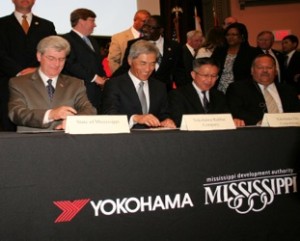Mississippi readily hands out taxpayer money to lure industry

By Steve Wilson | Mississippi Watchdog
Mississippi’s state government has handed out taxpayer money like Santa Claus to businesses, either to relocate or expand in the Magnolia State.
Cooper Tire and Yokohama Tire are two companies recently benefiting from various tax incentives, low-interest loans and grants offered by the state under the aegis of the Mississippi Development Authority. Is the investment worth the cost to taxpayers?
SIGN ON THE DOTTED LINE: Mississippi governor Phil Bryant and Hikomitsu Noji, president and representative director of The Yokohama Rubber Co. sign documents during the groundbreaking ceremony on a new tire plant in West Point.
“When you’re heavily providing businesses with tax incentives, you’re directing the power of the market and picking winners and losers,” said economist Scott Drenkard of the Tax Foundation. “These kind of privileges tend to message well for politicians.”
Cooper Tire could receive a $20 million bond issue from the state that was approved by the Mississippi House on Tuesday and a 10-year property tax cut that would save the company up to $18 million on its Tupelo plant, which opened in 1985 and employs 1,600. The company hopes to invest $140 million in improving the plant, not expanding it or adding to its workforce.
“The support from the government that is being discussed now is not related to physical expansion of the facility in Tupelo,” said Anne Roman, vice president of corporate communications for Cooper Tire. “It is related to enhancing equipment, which will make the Tupelo plant even more competitive in the years ahead.”
Roman said the upgrades aren’t about adding jobs, but “retaining jobs.”
The incentive package follows on the heels of the state’s move to lure Yokohama Tire to West Point, beating out five other states for the plant. The state will borrow $70 million for land, infrastructure and workforce training in addition to $12 million from local governments in the Golden Triangle area. The plant is expected to bring 500 jobs and $300 million initially.
That’s $90 million where the rubber meets the road for two projects. But not every project has a happy ending after the golden shovels used for groundbreaking are put away.
The idling of the KiOR biofuels plant, built with a $70 million state no-interest loan, might leave Mississippi holding the bag for $69.4 million. Twin Creeks, a solar panel firm that received $26 million in state loans, closed its Senatobia facility and folded in 2012. The state later recovered the money in a lawsuit.
The biggest failed project was the closed beef plant in Yalobusha County. Mississippi loaned $35 million to build a beef processing plant, but the project collapsed after a few months in 2004, prompting an FBI investigation. Five executives went to state and federal prison on various fraud and money laundering convictions. The state has recovered only $617,000 of the taxpayer money in that give away.
Drenkard said those tax incentives might not be the best use of taxpayer money because the hodgepodge of special privileges act as a barrier to real reform.
“It’s politically expedient to give money to selected businesses instead of cutting rates overall,” Drenkard said. “They don’t want to do the political legwork required. They’re ignoring the cost of opportunity and, when you provide one business or industry a tax break, you’re going to have less revenue to provide either more services or be able to lower rates overall.”
Mississippi’s state sales rate of 7 percent is the second highest in the country, according to data from the Tax Foundation. The foundation ranks the state 17th on its Business Climate Tax Index, a measure of how a state’s tax laws affect economic performance. Included in that measure was the state’s corporate income tax, which ranks 24th.
Drenkard said the state’s tax on business-to-business transactions also is an overall drain on Mississippi’s business climate.
“The crux of the issue is it’s a tradeoff,” Drenkard said. “When you give greater privileges to other industries, your tax base doesn’t do what tax bases are supposed to do, which is bring in revenue so the government can provide services. What you want is a broad base with lower rates.”
Contact Steve Wilson at swilson@watchdog.org
The post Mississippi readily hands out taxpayer money to lure industry appeared first on Watchdog.org.







